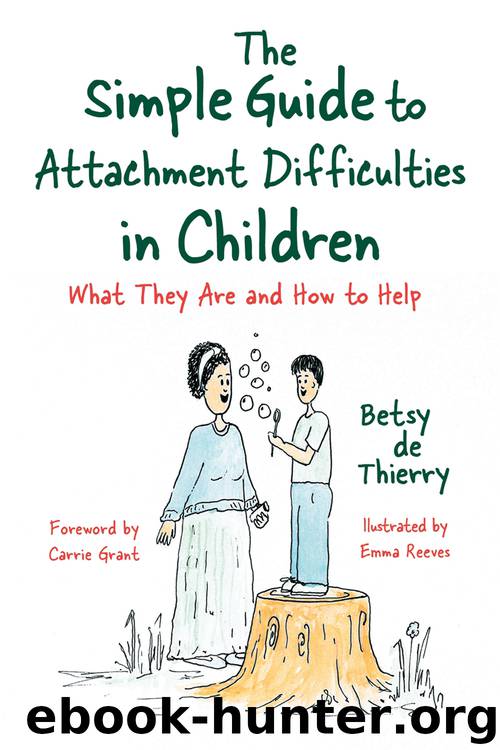The Simple Guide to Attachment Difficulties in Children by Betsy de Thierry

Author:Betsy de Thierry
Language: eng
Format: epub
ISBN: 9781785926402
Publisher: Jessica Kingsley Publishers
Published: 2019-05-04T16:00:00+00:00
Helicopter and controlling parenting
Helicopter parenting is a form of anxious parenting where the child does not have the liberty to leave their parent or carer to explore the world but instead is either told to or is made to feel that they have to remain near to the adult. Usually this is because the adult is scared that something bad will happen and would rather always be in control to try and protect the child and prevent anything frightening happening. Sadly, although this could sound kind and caring, it actually stops the child from being able to learn lessons about life and independence that are developmentally appropriate. It is often a very subtle message to the children from the parents that they must stay close to their parent and not explore due to the danger that they may experience and, whilst it is important for a child to grow in an understanding of boundaries, they can also learn anxiety about the world from an early age that can be damaging. A research study (Perry et al. 2018) that focused on ‘over controlling parenting’ during toddlerhood found that a greater desire for independence due to lack of ability to exert choices often puts toddlers in situations of increasing emotional challenge and complexity that can lead them to lack in self-regulation as they grow older:
If parents try to exert too much control over these situations and step in before children try to handle the challenge independently, or physically keep children from these frustrating or fearful contexts altogether, they may, unintentionally, hinder the development of children’s independent self-regulatory abilities. For example, if an over controlling parent removes a young child from a situation where, for a successful peer interaction, she needs to control her emotions/behaviour and share a toy, she may not develop the skills to navigate that situation in socially appropriate ways when a parent is not present. (Perry et al. 2018)
Some parents or carers are somewhat over-anxious about their children achieving things that they weren’t able to achieve as children and we refer to this as ‘living through them’. Children can feel huge pressure to live up to the expectations of their primary attachment figure and can feel anxious about ‘failing them’ or disappointing them. Again this is often a ‘secret’ anxiety because children find that difficult to put into words. We need to emphasise that we are aiming at supporting the children in becoming the best individual, unique person that they are and not a copy of anyone else.
Download
This site does not store any files on its server. We only index and link to content provided by other sites. Please contact the content providers to delete copyright contents if any and email us, we'll remove relevant links or contents immediately.
Rewire Your Anxious Brain by Catherine M. Pittman(18656)
Talking to Strangers by Malcolm Gladwell(13370)
The Art of Thinking Clearly by Rolf Dobelli(10489)
Mindhunter: Inside the FBI's Elite Serial Crime Unit by John E. Douglas & Mark Olshaker(9344)
Becoming Supernatural by Dr. Joe Dispenza(8217)
Change Your Questions, Change Your Life by Marilee Adams(7783)
Nudge - Improving Decisions about Health, Wealth, and Happiness by Thaler Sunstein(7709)
The Road Less Traveled by M. Scott Peck(7603)
The Lost Art of Listening by Michael P. Nichols(7506)
Mastermind: How to Think Like Sherlock Holmes by Maria Konnikova(7347)
Enlightenment Now: The Case for Reason, Science, Humanism, and Progress by Steven Pinker(7314)
Win Bigly by Scott Adams(7199)
The Way of Zen by Alan W. Watts(6614)
Daring Greatly by Brene Brown(6514)
Big Magic: Creative Living Beyond Fear by Elizabeth Gilbert(5774)
Grit by Angela Duckworth(5615)
Ego Is the Enemy by Ryan Holiday(5450)
Men In Love by Nancy Friday(5240)
The Laws of Human Nature by Robert Greene(5208)
